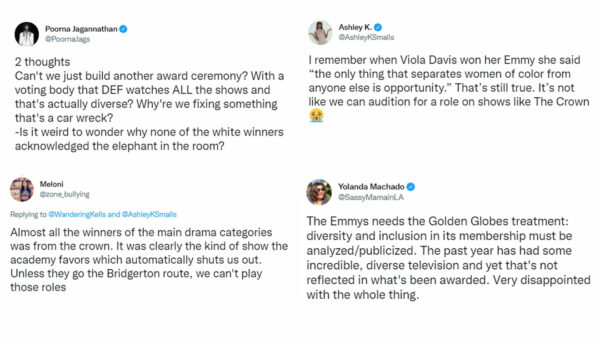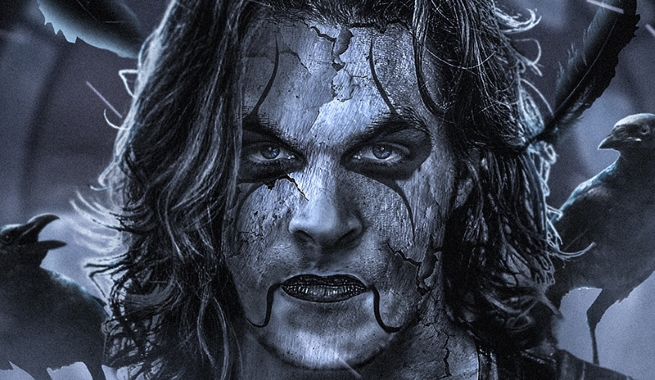The 73rd Primetime Emmy Awards that were held on Sunday saw no actors of colour winning in any of the major performance categories despite the Television Academy announcing a record-breaking nominations slate with respect to diversity. This led to the Emmys getting called out by netizens, several of whom used the #EmmysSoWhite hashtag to express their outrage.
Significant nominated performances by actors of colour that were overlooked included those of Billy Ray Porter and Mj Rodriguez in the FX show Pose.
Porter received a nod in the Outstanding Lead Actor in a Drama Series category, that saw a total of four people of colour nominated. Rege-Jean Page (Bridgerton), Jonathan Majors (Lovecraft Country), and Sterling K Brown (This Is Us) were the other three. However, all four lost to Josh O’ Connor, who essayed the role of Prince Charles in the Netflix show The Crown.
Meanwhile, Rodriguez, who became the first ever transgender performer to receive an Emmy nomination in a major acting category, lost out to Olivia Colman in the Outstanding Lead Actress in a Drama Series category. Colman took home the award for her role in The Crown.
Colman’s colleague and fellow nominee, Emma Corrin, who played Princess Diana, would have become the first openly non-binary actor ever to win an acting Emmy were the award given to her, as per Variety.

The lack of diversity in the awards this year came as a surprise, as the 72nd Emmys felicitated artists of colour like Zendaya, Yahya Abdul-Mateen II, Uzo Aduba, and Regina King, and shows like Watchmen.
One of the few countable wins for the non-white community at the 73rd Emmys came when Michaela Coel, the writer, director, and star of I May Destroy You, won for best writing in a limited series.
While none of the actors in the musical Hamilton won, the musical itself won the Outstanding Variety Special (Pre-Recorded) Emmy.
The Creative Arts Emmys, that were held on September 11 and September 12, were more inclusive in nature.
Maya Rudolph won the Outstanding Guest Actress In A Comedy Series award for her appearance in Saturday Night Live, and the Outstanding Character Voice-Over Performance award for voicing Connie the Hormone Monster in Netflix’s Big Mouth, at the Creative Arts Emmys. She became the third Black woman ever to win back-to-back acting Emmys in the same category.
American drag queen and host of the show RuPaul’s Drag Race, RuPaul Charles won the Emmy for Outstanding Host for a Reality or Competition Program for the sixth year in a row.
The show was further declared winner in the outstanding competition program category on Sunday. RuPaul, who also serves as the executive producer on the show, has reportedly won 11 Emmys so far – the most won by any person of colour.
Also winning at the Creative Arts Emmys earlier was HBO’s A Black Lady Sketch Show, which won the Emmy for Outstanding Picture Editing for Variety Programming. The show’s entire cast, as well the writers’ room, consists of Black women.

Several artists, including former Emmy winners and nominees, have voiced out against the all-white wins at Sunday’s Primetime Emmys.
Ashley Nicole Black, who won an Emmy in 2017 for writing the show Full Frontal with Samantha Bee Presents Not the White House Correspondents’ Dinner, noted on Twitter that there have been only 33 Black women Emmy recipients so far.
Another netizen wrote, “I remember when Viola Davis won her Emmy she said ‘the only thing that separates women of color from anyone else is opportunity.’ That’s still true. It’s not like we can audition for a role on shows like The Crown.”
Recommended
Journalist Benjamin Ryan, in a reply, wrote, “The point is that a lot of the shows and movies that win awards are historical dramas that because of historical accuracy have largely all-white casts. Some people see this as an all too convenient way to keep celebrating the same old thing: entertainment for and about whites.”
Inclusion and representation in terms of awards and recognition, has become a major concern in recent times. Earlier this year, the Golden Globes came under fire for nominating Lily Collins and her Netflix show Emily in Paris and leaving out Coel and her show.
The Globes curator, Hollywood Foreign Press Association (HFPA), went on to receive a streak of backlash from across the globe due to its lack of inclusion. It culminated in around 100 studios, including Netflix and Amazon, distancing themselves from the HFPA and compelling the association to redraw its plans.



